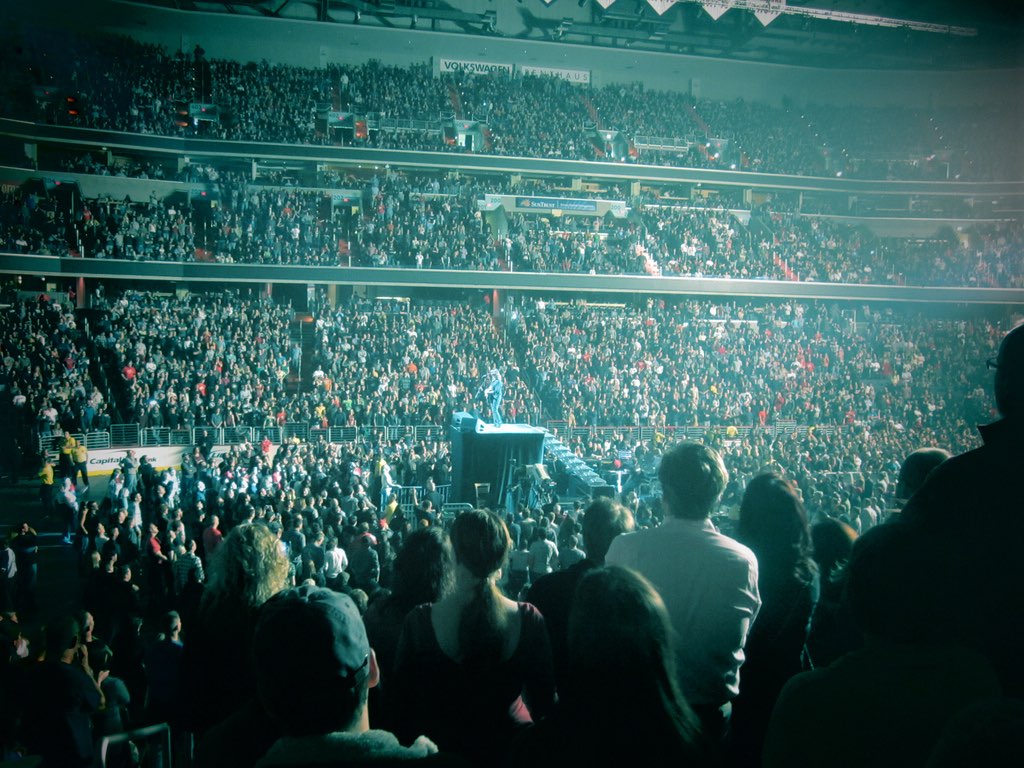Famous rock band Foo Fighters will christen new DC music venue the Anthem in grand fashion this week, playing a “secret” concert Wednesday and a proper show there Thursday. Second-hand tickets for Thursday’s event are trading at robust prices. Photos from friends lucky enough to get in will undoubtedly light up your social media platforms both nights.
As far as the visual record for the show, those iPhone pics may have to do. In exchange for a permit to photograph their shows, Foo Fighters make several demands on photographers via a document called a photo release. The release Foo Fighters used in 2015 asked that publications submit photos to the band for approval, stipulated that photos couldn’t be reused, and also asked for copyright on any photos they take. Washington City Paper published the form and asked readers to send in their cell-phone photographs instead.
“I don’t get the outrage,” a representative for Foo Fighters tells Washingtonian in a phone call. Foo Fighters have loosened restrictions on photographers, this person says, and no longer ask for copyright in perpetuity. (The person wouldn’t share the current document with Washingtonian unless we sent a photographer; we declined a few days earlier after confirming we’d have to sign a release.) Besides, the person says, it’s not like we’re talking about the future of the republic here. “It sounds like it’s so draconian,” the person says. “This isn’t a penalty for not getting your health insurance. Anyone who doesn’t like it doesn’t have to shoot.”
That’s certainly true, and what’s more, these releases aren’t unheard of among big music stars. Beyonce and Lady Gaga are among the artists who have enforced strict controls on photographs of their performances (In response to the Killers banning unauthorized photographers, one Irish outlet illustrated a review of the band’s show with Lego bricks.). A photo editor who wasn’t authorized to speak on the record had several criticisms of the practice, but stressed the point that such tactics are bad for music history. We have such an excellent archive of photographs of bands like Led Zeppelin, the photo editor says, because “that era respected photography. And therefore they have a great archive.”
So why do Foo Fighters, whose singer grew up in a DC music scene that spawned so much remarkable photography, use the releases? Their representative says artists use them “typically just to make sure they have access at market rates to the photos if they want to use them for a box set” or other merchandise. Some photographers have asked for a lot of money when a famous group wants to use one of their photos. The photo editor believes it’s also about the group trying to protect its less tangible assets. “It’s like brand vs brand,” the photo editor says of Foo Fighters. “In some ways you can see a future ten years down the road where they’ll be just the brand.”
I contacted some local publications to see who plans to populate the Anthem’s new photo pit Thursday. Washington City Paper no longer runs concert reviews or photo recaps, says its arts editor, Matt Cohen. “But if we were, we would decline to sign their request to relinquish the rights to the photographs,” he adds. “We aren’t reviewing the show, so no,” says Rachel Sadon, DCist’s editor, a decision she says has nothing to do with the release. Brightest Young Things plans to shoot the show, but if its photographer declines to sign the waiver, “we’re perfectly fine skipping coverage,” says Brandon Wetherbee, the publication’s managing editor. Keeping out professional photographers, he says, “means worse photographs and more unflattering memes.”
The Washington Post has photographed the band many times. Kyle Gustafson, a freelancer who’s shot the band for the paper on several of those occasions, says he’s not allowed to sign releases on the Post‘s behalf. “Any photo releases get vetted and approved (or not) by the photo desk well before the gig,” he writes in an email. Washingtonian somehow ended up on an internal Post email chain after I asked what its policy was with regard to photo releases, and it certainly didn’t look as if the photo desk is predisposed to signing one.
I asked the Foos’ representative if the rules applied to all publications. “If you have a good working relationship, it’s negotiable,” the rep says, adding that if City Paper had called, they could have probably worked something out. (Reached via direct message on Twitter, Steve Cavendish, City Paper‘s editor at the time, said the weekly “absolutely reached out. I talked to Nasty Little Man [the band’s publicity firm] and they said no changes.”) “I think the most misunderstood thing is people think that they’re giving up something,” the Foo Fighters’ rep says. “Not to belittle the photographer’s role too much, but those pictures don’t exist without the artist. Most people have to pay to get into the show.”
Deputy features editor David Malitz, who oversees the Post‘s music coverage, says the Post plans to send a reviewer and a photographer Thursday and that as far as he’s aware it won’t sign any such release. I asked him if the issue came up a lot.
“It’s very rare,” he says. “The last time I definitely remember going through it was Foo Fighters.”



















